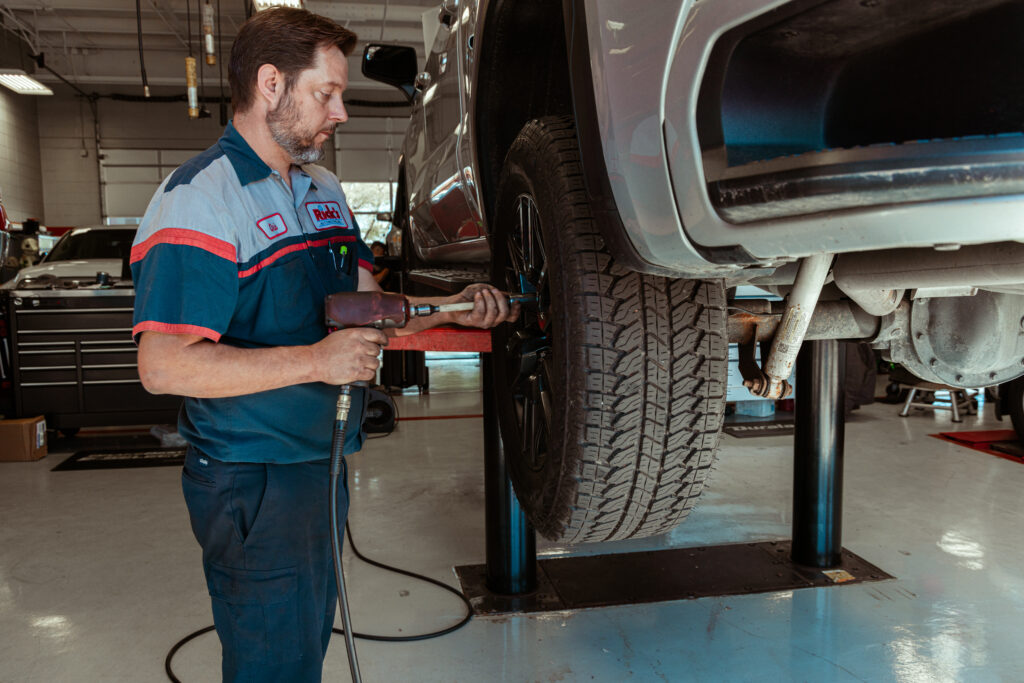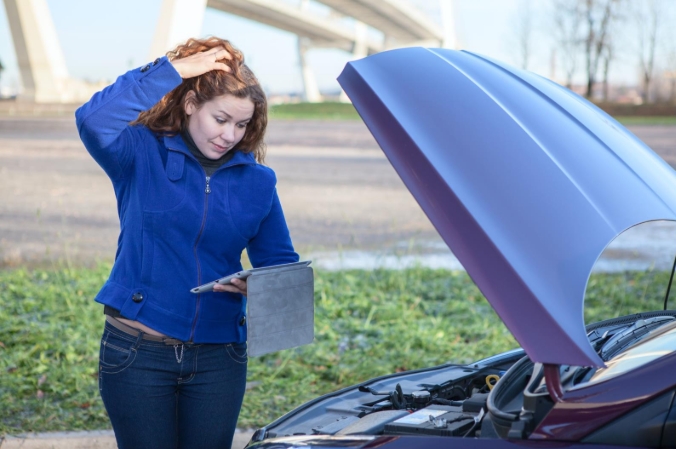
Imagine it’s a warm, sunny spring morning. The flowers are vibrantly blooming, the birds are chirping, and a gentle breeze brushes your skin as you open the car door, anxious to finally hit the road for that scenic drive through the rolling hills. You pull out of your driveway, windows down, taking in that (literal) breath of fresh air. It’s a perfect day.
Then, bam! That dreaded check engine light blazes on without warning, and your car suddenly loses power. “What?! Nooo!” Perfect day officially ruined.
Getting routine car tune-ups can help prevent frustrating moments like this from disrupting your plans. Let’s find out how, and what a car tune-up is exactly.
What is a Tune-Up?
A car tune-up is essentially a health check-up for your vehicle. Similar to why you visit the doctor for regular check-ups to identify potential health issues before they develop into serious conditions, you bring your car to a certified mechanic for a thorough tune-up to detect any underlying problems before they turn into major issues.
A certified mechanic will check various components and systems during a tune-up to ensure proper functioning. They will advise you of any adjustments, repairs, or replacements needed to prevent serious issues from occurring down the road (pun intended). You will be provided with a list of recommended services and associated costs, which are typically performed at that time, with your authorization.
Not all car tune-ups are comprehensive. Depending on your vehicle’s age and mileage, you might only need a basic tune-up, which addresses core maintenance elements. A more thorough engine tune-up focuses primarily on engine components, and a full vehicle tune-up (comprehensive) covers the entire vehicle.
It’s always a good idea to consult a certified mechanic at a reputable auto shop, such as Rick’s Automotive, to discuss the type of tune-up service they recommend for your vehicle and what it includes. Depending on the context and service provider, “basic tune-up” and “engine tune-up” may be used interchangeably, but the distinction will be made here to clarify potential differences.
This is a general breakdown of what might be covered under a basic (general) tune-up, an engine tune-up, and a comprehensive (full vehicle) tune-up. You will also learn why each element is essential and what can happen if neglected.

What Does a Tune-Up Include?
Basic Tune-Up
A basic tune-up will address the core elements of vehicle maintenance, such as:
- Spark Plug Replacement Service: Spark plugs, wires, and coils are checked and replaced, if worn. Spark plugs ignite the fuel and keep your car running efficiently. Worn components can lead to poor engine performance, misfiring, hard starting, poor fuel efficiency, rough idling, increased emissions, stalling, and engine knocking, leading to potentially expensive repairs.
- Ignition System Check (Conventional): In older vehicles with conventional ignitions, the distributor cap and rotor are also checked for cracks, corrosion, or wear, and the ignition timing may be checked and adjusted. The ignition system enables your car to start and run efficiently. Faulty components will cause the same type of issues and consequences as faulty spark plugs, coils, or wires.
- Air Filter Replacement During Tune-Up: A clean air filter allows your engine to “breathe” effectively. A dirty filter can reduce engine performance, causing poor fuel efficiency, increased emissions, engine misfires, and damage to the sensors that monitor and adjust your engine’s performance. Excessively restricted airflow will eventually damage the engine, causing costly repairs.
- Fuel Filter Replacement: The fuel filter keeps impurities from entering the fuel system, protecting the fuel injectors and your engine. A dirty fuel filter can reduce engine power and cause stalling, hard starting, poor fuel economy, misfiring, fuel pump strain, increased emissions, and damage to the engine and its fuel system components, which will cost you a pretty penny to replace.
- Inspecting Belts and Hoses: The belts and hoses are checked for wear, cracking, or damage and replaced as needed. These play a vital role in your engine’s operation and, if they fail, can lead to severe damage, including engine failure, overheating, and sudden breakdowns. Early detection and replacement can save you from highly costly repairs and potentially dangerous circumstances.
- Checking Essential Fluids: Engine oil, coolant, transmission, brake, and power steering fluids are checked and topped off or replaced if contaminated. These fluids are critical for lubricating and cooling the engine, maintaining seals, and smooth hydraulic functions. Low or contaminated levels can cause excessive wear or overheating, leading to expensive repairs.
Engine Tune-Up
In this context, an engine tune-up is a more thorough inspection, adjustment, and replacement of your engine’s components and systems. In addition to what’s covered in a basic tune-up, a more detailed engine tune-up may also include:
- Battery Testing: The battery’s charge and terminals are tested and cleaned as needed. The battery starts the engine, stabilizes voltage, and powers electrical components when the engine is off. If it’s not charging correctly, damaged, or corroded, it’s just a matter of time before your car won’t start and you’re left stranded.
- Alternator Check: The alternator charges the battery and powers the electrical systems while your engine runs. A faulty alternator can drain the battery, making it difficult to start your car, cause electrical issues, lead to a breakdown, and require you to replace the battery prematurely.
- Ignition System Check (Electronic): Most modern vehicles use electronic ignition systems to manage timing efficiently. A diagnostic scan may be run to check for fault codes that must be addressed. Issues can affect engine performance, fuel efficiency, emissions, and reliability, causing misfires and stalling. Replacing faulty components helps prevent costly damage to other components.
- Inspecting the Engine Mounts: Engine mounts keep the engine in place and absorb vibrations, ensuring a smoother and quieter ride. If worn or damaged, excessive noise, vibration, and misalignment can occur, potentially damaging other critical systems like the transmission, which are not cheap to repair or replace.
- Cooling System Check: The radiator, water pump, thermostat, and cooling fan are checked for leaks, cracks, corrosion, blockages, and proper functioning. The cooling system regulates the engine’s temperature. If any of its components are compromised, the engine could overheat, causing severe damage to your engine and your wallet.
- PCV Valve Inspection: The PCV valve, part of the emissions control system, helps reduce harmful emissions by redirecting leftover gases back into the engine to be burned–keeping the engine clean and running smoothly. A defective PCV valve can cause engine misfiring and rough idling, excessive oil consumption and sludge, and blown gaskets and seals, resulting in oil leaks and costly engine damage.

Full Vehicle Tune-Up Service
A comprehensive or full vehicle tune-up service goes beyond the engine and addresses various other components of your car, such as:
- Brake System Inspection: The brake lines, hoses, and assemblies are inspected for leaks, wear, or damage–including pads, rotors, and calipers in disc brakes and brake shoes and drums in drum brakes. The brake pedal and parking brake are also tested for proper functioning. Worn or defective components can greatly increase your risk of collision due to increased braking distance or complete brake failure.
- Fuel System Check: The fuel injectors, pump, and pressure regulator are examined to ensure the fuel is delivered efficiently and the engine performs well. A fuel system cleaning may also be recommended. Defects in the fuel system can lead to poor engine performance, difficulty starting, poor fuel efficiency, increased emissions, potential engine damage, and costly repairs.
- Throttle Body Cleaning: The throttle body is part of the intake system. It controls the airflow into the engine, ensuring it mixes appropriately with fuel to keep your car running smoothly. A defective throttle body can cause rough idling and stalling, poor acceleration, and increased fuel consumption. If left unchecked, it can lead to expensive damage to the engine and other components.
- Suspension and Steering Check: The suspension and steering maintain your vehicle’s stability and handling. Components such as shocks, struts, mounts, tie rods, and ball joints are visually inspected for signs of wear or damage. Alignment and tire condition are also checked. Worn or damaged parts can lead to poor handling, noise and vibrations, uneven tire wear, and a rough ride. Neglecting these compromises your safety and can lead to expensive repairs.
- Transmission Inspection: These components, including the housing, seals, and gaskets, are visually inspected to identify leaks, wear, damage, or corrosion. A diagnostic scan may also be run to check for fault codes, and a test drive may be conducted to check for shifting smoothness and abnormal noises. Catching potential issues early can save you from serious issues such as transmission failure, poor performance, and high-dollar repairs.
- Exhaust System Inspection: The exhaust system is critical for efficient engine performance, reducing emissions, and preventing dangerous fumes from entering the cabin. Cracks, leaks, clogs, or damage to these components must be addressed. A damaged exhaust system will reduce engine performance, increase emissions, cause excessive noise, pose a serious health risk, and lead to pricey repairs.
- Diagnostic Check: A diagnostic scan is typically run using specialized equipment to connect to your car’s computer system and check for Diagnostic Trouble Codes (DTCs). This helps mechanics pinpoint issues that must be addressed within your vehicle’s various systems and components.
These lists are not necessarily extensive, meaning additional checks may be performed depending on the service provider and your vehicle’s needs. Early detection of issues is key to preventing serious issues requiring costly repairs and risks to your safety, as well as helping maintain your car’s health and extend its lifespan.

Signs You Need a Tune-Up
Routine tune-ups are essential to early detection, but if you notice any of these signs, it’s time to get a tune-up sooner rather than later:
- You notice a decrease in fuel efficiency
- Rough idling, stalling, or misfiring
- Difficulty starting the engine or Battery Charge Warning light is on
- Unusual noises or vibrations
- Check Engine or Service Engine Soon light is on
- Oil Pressure, Brake System, or Traction Control Warning light is on
- Your temperature gauge reads hot, or the Coolant Temperature Warning light is on
- The gears are not shifting smoothly
- Unusual or colored puddles under your vehicle
- Burning smell or foul odors
- You notice smoke or steam coming from anywhere inside or outside your vehicle (aside from normal-looking steam coming out of your tailpipe in cold weather)
- Difficulty steering or braking
- Poor acceleration
- Electrical issues
Letting any of these issues persist can escalate into significant damage, which can risk your safety and require major repairs that can break the bank. If you notice anything that feels off or unusual regarding your vehicle, even if it’s not on this list, it’s always best to get it checked out just to be safe.
How Often Should You Get a Tune-Up?
The frequency of tune-ups depends on your vehicle’s make, model, age, mileage, and driving habits. For specific manufacturer recommendations, it’s always best to refer to your owner’s manual.
However, as a general rule, tune-ups are recommended for older vehicles with conventional ignition systems every 10,000 – 12,000 miles or annually. Modern vehicles with electronic ignition systems typically only need a tune-up every 25,000 – 30,000 miles or every two years, and in some cases, even less often.
How Much Does a Car Tune-Up Cost?
The cost of a car tune-up can vary widely depending on the services included and your vehicle’s make and model. Parts and labor can be more expensive on some make and models due to their complexity, luxury features, and specialized labor requirements, such as Land Rover, Porsche, Mercedez-Benz, BMW, Audi, Cadillac, Volvo, and Jaguar.
On average, you can expect to pay between $200 and $800 for a comprehensive tune-up, possibly more if complex maintenance or high-dollar parts are involved. Investing in regular tune-ups can save you money in the long run by preventing major repairs and improving your vehicle’s fuel efficiency.
Improve Gas Mileage with a Tune-Up
One significant benefit of a car tune-up, aside from preventing serious and expensive repairs, is improved gas mileage. A tune-up can help you get the most out of every gallon of fuel by ensuring your engine and other components are running efficiently.
Stay Ahead of Car Troubles with Rick’s Automotive
Regular tune-ups are key to preventing costly breakdowns. Don’t wait for unexpected car issues to disrupt your life—and your wallet. You can schedule a tune-up with Rick’s Automotive by calling (417) 887-2225 or scheduling online. Our skilled technicians will keep your vehicle running smoothly and efficiently.
Want to take the guesswork out of when it’s time to schedule maintenance? Join our Preventative Maintenance Program and get manufacturer-recommended maintenance reminders via email, along with coupons to save you money.
